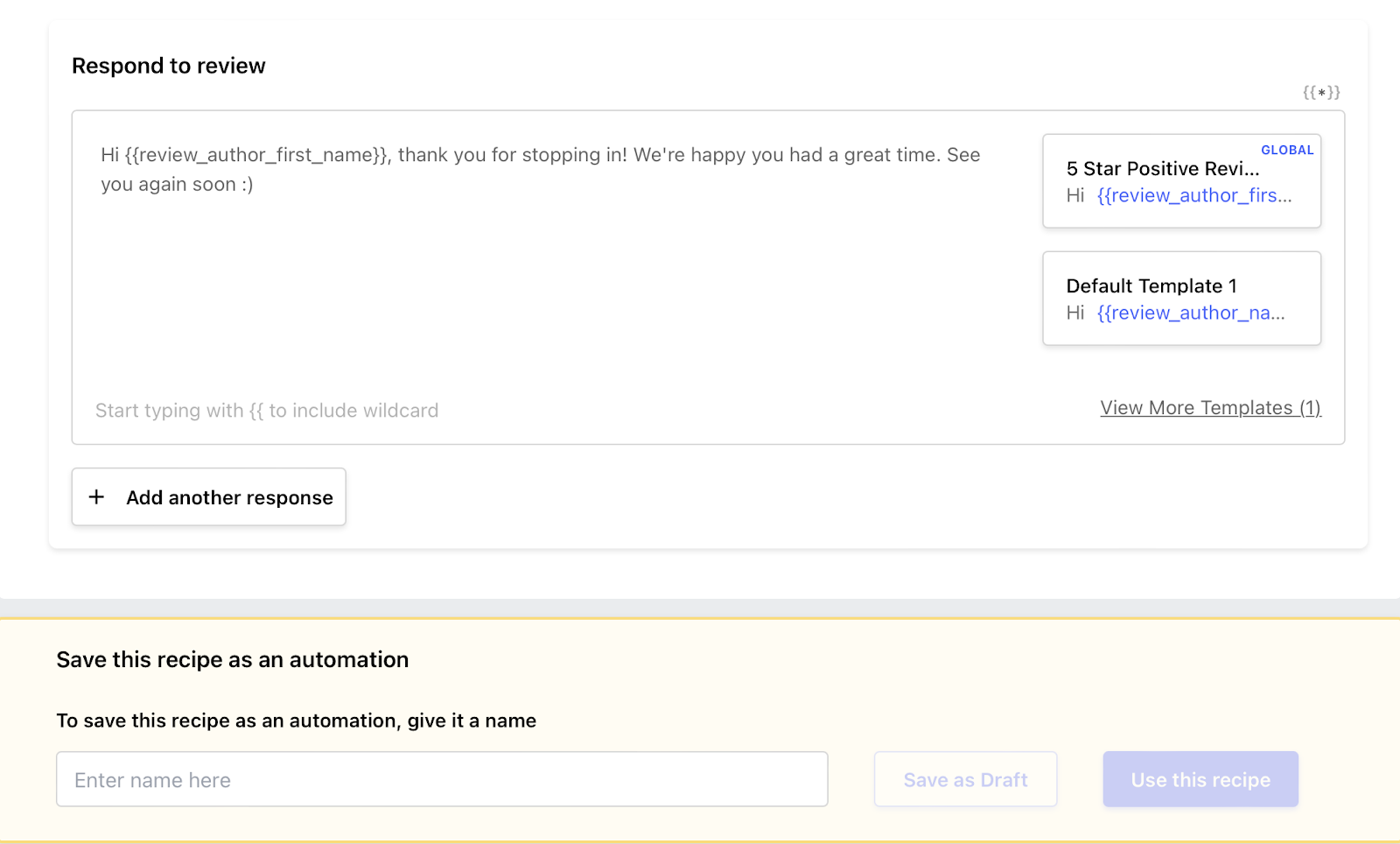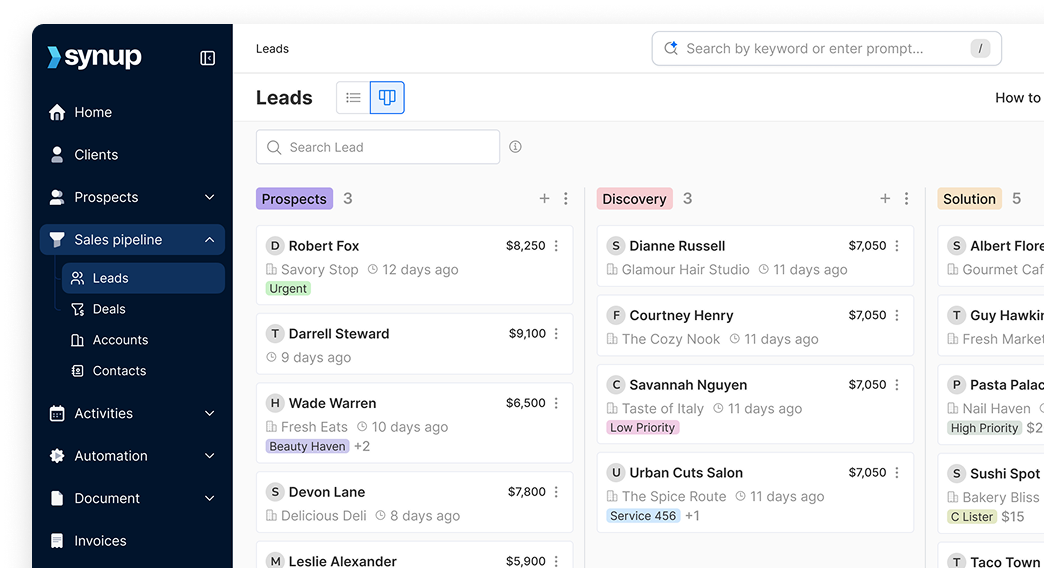Comment gérer la réputation en ligne
Gérez votre réputation en ligne pour fidéliser vos clients existants, en attirer de nouveaux et vous imposer comme le fournisseur de services de référence dans votre créneau.

Les réseaux sociaux et les sites d'évaluation ont considérablement influencé la réputation en ligne de nombreuses agences, contribuant à la fois à leur succès et à leur chute.
Les histoires racontées à propos de votre marque sur les réseaux sociaux peuvent faire ou défaire votre entreprise. Un seul avis négatif de la part d'un client mécontent peut avoir un impact dévastateur sur votre réputation.
C'est pourquoi efficace gestion de la réputation en ligne est devenue cruciale, en particulier pour les entreprises possédant plusieurs sites, car presque tous les consommateurs se fient aux avis et aux réseaux sociaux pour effectuer des recherches sur les entreprises.
Les dirigeants mondiaux estiment qu'en moyenne, 63 % de la valeur de marché de leur entreprise est liée à sa réputation globale. Cela est logique, étant donné qu'une écrasante majorité (89 %) des consommateurs s'efforcent de consulter les avis en ligne avant d'acheter un produit.
Presque tous croient ce qu'ils voient en ligne à propos de votre marque.
Avant de vous plonger dans la façon dont vous pouvez gérer la réputation en ligne, redéfinissons-le pour mieux le comprendre.
Réputation en ligne est l'impression générale que les résultats des moteurs de recherche, les avis, les évaluations et les réseaux sociaux donnent de votre entreprise sur ses sites.
Puisque votre réputation en ligne vous précède, quelle que soit votre position actuelle, il y a toujours place à l'amélioration. Vous avez la capacité d'influencer la façon dont les gens perçoivent votre marque.
Environ 49 % des consommateurs font autant confiance aux avis en ligne qu'aux recommandations personnelles. Ainsi, si vous gérez une entreprise multi-sites, gagner la confiance des clients et générer plus de ventes devraient être des priorités absolues. Une réputation en ligne positive est essentielle pour atteindre ces objectifs. En maintenant et en améliorant constamment votre réputation, vous êtes déjà à mi-chemin de l'établissement d'une solide crédibilité et d'un succès à long terme.
Lisez la suite pour savoir pourquoi critiques en ligne gestion est important pour les agences et pour la manière dont vous pouvez prendre le contrôle de la vôtre.
Pourquoi prendre le contrôle de votre réputation en ligne
Dans ce monde hautement connecté, vous ne pouvez pas contrôler ce que les gens disent de votre marque, mais vous pouvez contrôler la façon dont vous réagissez.
Les évaluations fournissent des informations précieuses sur les domaines dans lesquels vos services excellent et sur les domaines dans lesquels ils peuvent être à la traîne. De plus, ils offrent un avantage concurrentiel et attirent des clients potentiels.
Une enquête de PowerReviews a révélé que près de la moitié (45 %) des acheteurs en ligne n'achèteront pas auprès d'une marque sans avis. Pire encore, si les clients ne sont pas satisfaits d'un site, ils peuvent éviter l'ensemble de votre marque, et pas seulement cette succursale en particulier. Les avis négatifs peuvent faire boule de neige et augmenter considérablement les risques de perdre des clients potentiels dans toutes vos succursales. C'est pourquoi il est essentiel de gérer la réputation en ligne efficacement. Votre capacité à répondre aux préoccupations, à faire preuve de réactivité et à maintenir une image publique positive peut faire toute la différence pour établir une confiance durable avec votre public.
Voici quelques raisons importantes pour lesquelles les personnes qui gèrent une marque multi-sites devraient gérer leur réputation en ligne.
La réputation en ligne influe sur la confiance
Étant donné que votre réputation en ligne englobe toutes les histoires racontées à propos de vos services, il ne fait aucun doute qu'une bonne réputation est essentielle pour établir un climat de confiance avec vos clients.
Les clients sont fortement influencés par ce qu'ils voient en ligne, donc gestion de la réputation en ligne est essentiel pour gagner de nouveaux clients, fidéliser les clients existants et augmenter vos ventes.
Une bonne réputation augmentera votre visibilité en ligne, attirera de nouveaux clients et renforcera la confiance avec vos clients existants. Les critiques et les profils positifs vous aident à vous démarquer et peuvent vous mener à plus d'affaires.
Une réputation positive créera un avantage concurrentiel solide
Une bonne réputation en ligne vous donnera un avantage sur les autres concurrents du jeu. Les avis positifs et les notes élevées vous aideront à fidéliser rapidement vos clients potentiels et à les fidéliser.
Gestion des avis en ligne Les sites d'évaluation et les réseaux sociaux peuvent également renforcer la notoriété de votre marque et vous donner un avantage précieux, en vous aidant à attirer plus de clients que les autres.

De plus, une participation active sur les sites d'évaluation et les plateformes de réseaux sociaux peut améliorer la visibilité et la crédibilité de votre marque. Répondre aux commentaires des clients, qu'ils soient positifs ou négatifs, démontre que vous appréciez leur contribution et que vous vous engagez à vous améliorer continuellement.
En entretenant constamment votre réputation en ligne, vous obtenez un avantage précieux pour attirer plus de clients, les fidéliser plus longtemps et favoriser des relations commerciales à long terme. Cela peut augmenter considérablement la notoriété de votre marque, faisant de vous le choix préféré dans votre secteur d'activité.
La réputation en ligne peut renforcer votre image de marque et votre perception
La façon dont votre marque est présentée en ligne à travers les avis, les profils sociaux et les résultats de recherche aura un impact sur la façon dont les clients potentiels la perçoivent. Une bonne réputation signifie que vous êtes fiable, que vous proposez un contenu de haute qualité et, surtout, que vous offrez un excellent service client.
Obtenir régulièrement des avis positifs sur des plateformes telles que Google, Facebook et des sites d'évaluation de niche peut renforcer votre crédibilité, en particulier si vous êtes propriétaire d'une marque avec plusieurs sites.
Lorsque les clients potentiels constatent que d'autres personnes ont eu des expériences positives avec votre marque, ils sont plus susceptibles de choisir vos produits ou services par rapport à ceux de vos concurrents.
Investir dans votre surveillance de la réputation ne se limite pas à gérer les perceptions, il s'agit d'une initiative stratégique qui peut favoriser la croissance, la fidélité des clients et un succès durable.
Permet de mieux contrôler votre présence en ligne
Lorsque vous maintenez un profil complet et gérer la réputation en ligne quels que soient les moteurs de recherche et les listes, vous aurez un contrôle total sur les informations diffusées en ligne concernant votre marque. Cela vous permettra de corriger rapidement le contenu inexact ou obsolète et de transmettre le bon message.
Lorsque vous contrôlez votre réputation en ligne, vous pouvez façonner les récits de votre marque. Vous pouvez mettre en avant les aspects positifs, partager des réussites et présenter les témoignages de clients, tout cela peut contribuer à renforcer votre réputation en ligne.
Régulier surveillance de la réputation vous permet également de suivre les avis et les mentions des clients afin de pouvoir répondre à temps. Lorsque les clients constatent que vous êtes engagé et réactif, vous êtes plus susceptible de considérer votre marque comme fiable et axée sur le client.
La réputation en ligne attire des prospects qualifiés
Les avis constituent une puissante preuve sociale. Les critiques positives et les notes élevées peuvent attirer de nouveaux prospects sans frais, et il sera beaucoup plus facile de convertir un visiteur ponctuel en un client fidèle à long terme lorsque vous jouissez d'une bonne réputation.
Gestion des avis en ligne sur des sources fiables telles que Google vous aideront à cibler des publicités qui encouragent les anciens clients à partager leurs expériences et à fournir des témoignages sur votre travail pour et avec eux.
Augmentez la satisfaction des clients
La recherche proactive d'avis montre que vous vous souciez de répondre aux besoins de vos clients. De plus, le suivi d'un projet pour en savoir plus sur les points faibles peut vous aider à affiner vos services.
En prenant des mesures pour gérer la réputation en ligne, vous pouvez résoudre les problèmes ouvertement, ce qui renforce la confiance, tandis que la clôture des enquêtes montre que vous avez tiré les leçons de l'expérience. Des communications personnalisées après l'achat permettront à vos clients de se sentir valorisés, ce qui augmentera leur fidélité et leur satisfaction, ce qui se traduira par une augmentation des références et des revenus.
Démontre votre service client
En tant que propriétaire d'entreprise possédant plusieurs sites, il est essentiel de donner la priorité à un excellent service client pour promouvoir les recommandations. Lorsque vous êtes actif gérer la réputation en ligne en répondant à tous les avis, qu'ils soient positifs ou négatifs, vous envoyez un message clair à vos clients indiquant que vous appréciez leurs commentaires.
Le traitement des plaintes, même mineures, peut contribuer à prévenir la perte de clients et à améliorer votre service client global. De plus, le traitement des plaintes de manière privée et professionnelle peut transformer des clients mécontents en défenseurs fidèles.
Une réputation positive augmentera la visibilité de votre moteur de recherche
Au fil du temps, les recherches en ligne sont devenues la première étape de l'acquisition de nouveaux clients, ce qui rend la visibilité dans les résultats de recherche cruciale pour votre entreprise. La gestion régulière de vos profils commerciaux sur les principaux sites d'annonces peut améliorer votre classement SEO local, vous permettant ainsi d'atteindre plus de clients de manière organique.
Améliorez les résultats en matière de marketing et de publicité
Gestion de la réputation en ligne constitue un puissant outil de marketing, renforçant vos autres efforts et générant un meilleur retour sur investissement (ROI). Les avis et les profils positifs permettent de recibler plus facilement les clients avec des offres spéciales.
La création de contenu mettant en valeur vos services spécialisés peut vous aider à établir votre autorité en tant qu'expert du secteur. En outre, le dialogue avec les clients sur les réseaux sociaux vous permet de transformer les discussions en plaidoyer de marque.
Les enquêtes peuvent également vous aider à comprendre les véritables besoins des clients, que vous pouvez intégrer à vos stratégies publicitaires. Dans l'ensemble, ces actions élargissent votre portée et améliorent l'efficacité de vos efforts de marketing au fil du temps.
Une réputation en ligne positive attirera les meilleurs talents
L'impact de gestion de la réputation en ligne va au-delà des évaluations et des avis, pour attirer plus de clients. Avoir une réputation en ligne positive démontre que vous êtes un leader dans votre créneau avec des clients satisfaits et un environnement de travail positif.
Cela peut attirer des candidats qualifiés qui souhaitent travailler pour une marque à succès.

Votre réputation en ligne peut également renforcer le sentiment d'épanouissement de vos employés actuels, en les rendant fiers de travailler pour une marque bien connue, ce qui peut les motiver à bien performer et à fournir d'excellents services.
Améliore les processus internes
Les commentaires des clients sont un excellent moyen pour vous d'identifier les lacunes dans la prestation de vos services et d'apporter des modifications si nécessaire. Cela évitera les erreurs récurrentes et aura un impact positif sur l'amélioration continue de votre prestation de services.
De plus, en prenant le temps de gérer la réputation en ligne En recherchant et en répondant activement aux commentaires, vous pouvez générer des avis positifs qui rationalisent votre flux de travail, l'allocation des ressources et les investissements technologiques. Les commentaires positifs des clients et de l'industrie peuvent contribuer directement à ce processus.
Permettre une prise de décision basée sur les données
Gestion de la réputation en ligne les outils fourniront des informations continues sur les avis, l'activité sociale, le classement des mots clés, etc. Ces données détaillées fournissent des informations détaillées sur les préférences des clients, ce qui vous permet d'optimiser vos services.
La comparaison de vos performances avec celles de vos concurrents peut révéler des opportunités de différenciation. Les commentaires peuvent également vous aider à affiner vos campagnes de réputation.
L'évolution du sentiment des clients peut indiquer une évolution de la satisfaction, orientant ainsi l'amélioration des processus. Ces informations sont essentielles pour créer des expériences numériques personnalisées et planifier stratégiquement une croissance à long terme.
Étapes pour gérer votre réputation en ligne
Gestion de la réputation en ligne n'est pas une tâche ponctuelle, c'est un processus étape par étape qui doit être suivi efficacement.
Voici les étapes que vous pouvez suivre pour gérer la réputation en ligne:
Étape 1 : Gestion cohérente
La première stratégie pour gérer votre réputation en ligne est de la contrôler, car elle est déjà en action. Vous pouvez le faire en surveillant les mots clés de vos services sur différents sites d'évaluation, plateformes de réseaux sociaux, sites de blogs et autres sources. Cela vous permettra de filtrer les commentaires positifs et négatifs concernant toutes les succursales de votre marque en ligne.
Vous pouvez conduire surveillance de la réputation par :
- Utiliser les alertes Google pour suivre vos mots clés relatifs à votre entreprise.
- Surveillez fréquemment les pistes sur les sites de réseaux sociaux les plus couramment utilisés, tels que Facebook, Instagram et X (anciennement Twitter).
- Surveiller toute requête concernant l'emplacement de votre marque sur les moteurs de recherche.
- Pour obtenir des résultats plus détaillés, il est recommandé d'utiliser gestion de la réputation en ligne outil.
Vous devez poursuivre ce processus pour continuer à tirer parti des commentaires du client et à en tenir compte rapidement. Ce processus permet d'identifier les faiblesses et les opportunités qui pourraient aider à rester actif.
Étape 2 : Répondre aux avis en ligne
Après avoir identifié les commentaires négatifs et positifs grâce à la surveillance, l'étape suivante de gestion de la réputation en ligne est d'apporter une réponse réfléchie et professionnelle.
Répondre de manière professionnelle et diligente aux avis démontre que vous vous souciez réellement de vos clients.

Voici quelques bonnes pratiques pour répondre aux avis :
- Pour chaque commentaire, qu'il soit positif ou négatif, assurez-vous de répondre pour montrer que vous reconnaissez le commentaire et que vous êtes concerné.
- À toute critique négative, la première réaction de base doit être rapide et non défensive. D'autres directives incluent le fait de répondre de manière professionnelle, polie et aussi courtoise que possible.
- Lorsqu'il s'agit de commentaires négatifs, ils doivent être traités avec prudence pour plusieurs raisons, notamment parce que les commentaires ont mis en évidence une erreur valable qui doit être corrigée.
- Fournir des solutions pertinentes et une indemnisation si nécessaire.
- Lorsque les clients établissent ce type de contact, la plupart seront impatients de recevoir une réponse à leur préoccupation dans un délai de 48 heures. Vous devez répondre à cette attente pour apporter une solution satisfaisante à leurs critiques négatives et gérer la réputation en ligne.
Étape 3 : Interagissez avec les clients sur les plateformes de réseaux sociaux
Les réseaux sociaux se sont considérablement développés pour devenir le principal média de gestion de la réputation en ligne qui peuvent avoir un impact positif ou négatif sur votre marque partout.
Vous pouvez interagir avec vos clients sur les réseaux sociaux en :
- Développez des publications quotidiennes sur les réseaux sociaux à propos des services que vous pouvez fournir.
- Répondre aux questions, aux commentaires et aux commentaires négatifs des clients.
- Veiller à ce que les clients donnent des commentaires et des témoignages positifs sur les services proposés.
Les réseaux sociaux sont une plateforme sur laquelle les clients interagissent ; leur utilisation pour interagir avec vos clients potentiels peut améliorer votre visibilité dans certaines communautés.
Étape 4 : Élaborez un moyen de surveiller et de maintenir le classement dans les moteurs de recherche
Bien qu'il soit toujours avantageux de prendre en compte gestion des avis en ligne et les commentaires des clients sur les produits et services que vous proposez, il est tout aussi important, sinon plus, de vous concentrer sur l'optimisation des moteurs de recherche et de faire en sorte que cette première impression compte.
Vous devez partir du principe et travailler en gardant à l'esprit qu'un meilleur classement sur les moteurs de recherche peut entraîner une croissance significative du nombre de clients potentiels.
Identifiez les termes de recherche liés à votre service, à votre localisation et à d'autres facteurs que les clients sont susceptibles de rechercher.
Le backlinking est un autre aspect important du référencement qui nécessite une attention particulière. Si vous obtenez des backlinks de qualité provenant d'autres sites liés à votre niche et de sites faisant autorité dans le secteur, les moteurs de recherche vous considéreront comme une autorité dans ce créneau particulier.
Le référencement doit être effectué régulièrement pour garantir une bonne visibilité de votre recherche organique et permettre aux clients potentiels de vous trouver en ligne sur plusieurs sites.
Étape 5 : Utiliser un logiciel de gestion de réputation en ligne
Pour gérer efficacement et professionnellement votre présence en ligne, il est essentiel de vérifier régulièrement tous les aspects du processus et de prendre les mesures appropriées si nécessaire.
Au lieu de vous fier aux méthodes traditionnelles, vous pouvez gérer la réputation en ligne en utilisant des outils et des services efficaces.
Ces outils proposent des solutions complètes de suivi de la réputation qui vous permettent de surveiller et de répondre efficacement aux fils de commentaires négatifs.
Grâce à ces ressources, le suivi des avis provenant de différentes plateformes devient plus facile à gérer, ce qui vous permet d'interagir avec vos clients et de renforcer la confiance et la crédibilité.
Surveillance de la réputation vous permet de contrôler votre image de marque en identifiant les tendances, en comprenant le sentiment des clients à l'égard de vos services et en minimisant l'impact des commentaires négatifs que vous rencontrez.
Il est important de noter que ces outils sont incroyablement bénéfiques, car ils simplifient le processus de gestion de la réputation en ligne et en entretenant des relations positives avec vos clients.
Vous pouvez y parvenir en suivant les mots clés de vos services sur les sites d'évaluation, les réseaux sociaux, les blogs et d'autres plateformes. Cela vous aidera à identifier les discussions positives et négatives concernant votre marque sur tous vos sites en ligne.
Résumant
En conclusion, la gestion de votre réputation en ligne est cruciale, surtout dans le contexte actuel, où les clients effectuent des recherches approfondies sur les marques avant de choisir des produits et services.
Cependant, satisfaire constamment vos clients avec un service exceptionnel tout en surveillant et en tenant compte des commentaires publiés en ligne peut être à la fois long et difficile.
La gestion manuelle de ces tâches peut souvent entraîner des inefficacités. Il est donc essentiel d'acquérir et de mettre en place une solution intégrée qui automatise le suivi de la réputation et fournit des informations exploitables. C'est là qu'un gestion de la réputation en ligne un outil comme Synup devient inestimable.
Synup est une plateforme de réputation complète qui vous permet de prendre le contrôle de votre présence numérique. C'est surveillance de la réputation L'outil regroupe les avis provenant de différentes sources telles que Google, Facebook et Trustpilot, vous alertant des commentaires positifs et négatifs en temps réel.
Avec Synup, vous êtes en mesure de façonner les conversations en ligne, de mieux comprendre vos clients et d'améliorer votre crédibilité, ce qui peut contribuer à une croissance à long terme. Réservez une démo aujourd'hui pour en savoir plus sur le programme.

Comment gérer la réputation en ligne : FAQ
À quelle fréquence dois-je surveiller ma réputation en ligne ?
Les avis peuvent arriver à tout moment, et la plupart des clients s'attendent à recevoir une réponse de votre part peu de temps après avoir soumis leurs commentaires.
Quand tu gérer la réputation en ligne régulièrement, vous serez en mesure de détecter et de résoudre les problèmes rapidement avant qu'ils ne s'aggravent. Des réponses rapides vous aideront à gérer les problèmes de manière efficace et à éviter toute atteinte à votre réputation.
Que puis-je faire en cas d'avis négatifs ?
Il n'y a aucun moyen de satisfaire complètement tous vos clients, vous devez donc vous attendre à des critiques négatives autant qu'à des critiques positives. Lorsqu'il y a une critique positive, vous devez l'aborder poliment et professionnellement.
Remerciez les clients d'avoir attiré votre attention sur vos manquements et décrivez les mesures que vous allez prendre ou avez prises pour résoudre le problème sans vous mettre sur la défensive. Rassurez le client en lui disant que l'erreur ne se reproduira plus et proposez-lui de faire un suivi si nécessaire pour assurer sa satisfaction à long terme.
Combien de temps faut-il pour améliorer ma réputation en ligne ?
Il n'existe pas de calendrier précis pour les améliorations potentielles. L'amélioration de votre réputation en ligne peut prendre des jours, des semaines, voire des mois. Tout dépend de divers facteurs, notamment du volume d'avis loin d'être idéal de la part des clients.
Est-il possible de supprimer toutes les mauvaises critiques concernant ma marque sur Internet ?
Malheureusement, il n'est pas possible d'éliminer tous les commentaires défavorables sur Internet. Bien que vous puissiez demander à l'administrateur du site de supprimer un contenu négatif spécifique, rien ne garantit que ces demandes seront honorées dans tous les cas. En raison de la permanence et de la portée du contenu en ligne, il est difficile de s'assurer que tous les avis négatifs soient effacés.

